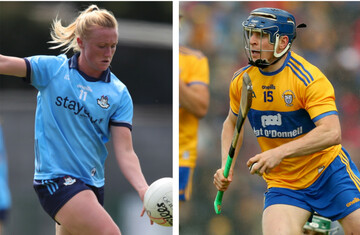DUBLIN FOOTBALLER CARLA Rowe and former Clare dual player Podge Collins have welcomed the findings of the GPA report which has highlighted the expenses incurred by players at inter-county level.
The report revealed that elite players suffer an average net expense loss of €4,602 per year, with GPA chairperson Tom Parsons calling on the Government and the GAA to provide more resources. He also warned that unless action is taken, players might “revolt and decide to stop playing.”
Another key finding of the report indicates that county players generate a total economic impact of €591m annually.
Collins, who won an All-Ireland with the Clare hurlers in 2013, described the figures as “stark,” and says efforts should be made to ensure players are financially stable considering the contribution they make to the economy.
“It’s not surprising that GAA players are making a significant loss on an annual basis,” he told The 42.
“You see people on Twitter [X] commenting that it’s a tough time for everyone. But when the inter-county game generates so much money for the economy, it’s a difficult one to swallow for GAA players and that’s why they’re so disappointed and probably a bit disillusioned, particularly students, by what they’re putting into a product that’s making money but costing them significantly.
“The basic costs should be at least covered. We’re not talking about pay for play, we’re talking about players not being at a loss for the amount of time, energy, application and expenses that they incur as a GAA player.”
Following the publication of the report, Tyrone goalkeeper, and a co-chair of the GPA’s National Executive Committee, Niall Morgan, said students can no longer afford to play at inter-county level.
Collins echoed that point and compared the current economic climate with his own memories of playing inter-county hurling while keeping a part-time job in college.
“When I was playing inter-county hurling around 2012-2014, I was able to hold down a part-time job working in a bar on a Friday and Saturday night. That day is gone. I got €50 a night roughly and that was enough for my rent, my food and petrol. I don’t know how inter-county students are surviving at the money.
“When I was playing, we got four hurleys a year for €120. Now, €120 will get you two hurleys. The same goes for boots. A proper pair is about €200, the voucher doesn’t even cover that.”
Five-time All-Ireland winner Rowe says there are similar financial constraints among inter-county players in Ladies Football. Working full-time as a teacher, Rowe can meet the costs involved in playing at elite level but says students she plays with “have to have part-time jobs.”
She also believes that there is a possible link between the challenges associated with expenses, and the high number of Irish players taking up AFLW. There are currently 40 Irish stars on lists ahead of the 2025 AFLW season, which is up from 33 last season. That number is also expected to rise before the competition begins in August.
Rowe can understand the appeal of switching to a semi-professional environment but is worried for the future of her sport.
“I said it in a few interviews at the league launch, I would be worried for Ladies Football.
“And now their season is moving in Australia and encroaching on our season which means players will have to make a decision. I think that’s really worrying for our game because the LGFA, Lidl and the players have spent so many years trying to build up the sport and we have a game that’s a really high standard.
“I would be worried about that dropping and losing the top players in counties. It’s just that we’re pushing the supports in the right direction across all four codes and trying to look after player welfare.”
Similar to Collins, Rowe has noticed a rise in costs compared with when she started playing for Dublin 11 years ago but believes that is partly down to an increase in the demands that are placed on players.
“You’re training four days a week whereas we weren’t back then. Our gym sessions probably weren’t collective but now they are. There’s a huge demand on nutrition and the more research you’re given, the importance of food and recovery and anything around your sleep, you’re trying to take that as seriously as possible.
“You’re making sure you have the best quality stuff and all of that is an increased cost.”












No it’s the usual going to sleep nearly always the same against arsenal
It was almost too easy against Arsenal until Ramseys goal and then suddenly we couldnt re-establish our focus……we were given numerous warnings by Giroud tho and still looked lethargic.
Agreed fran!